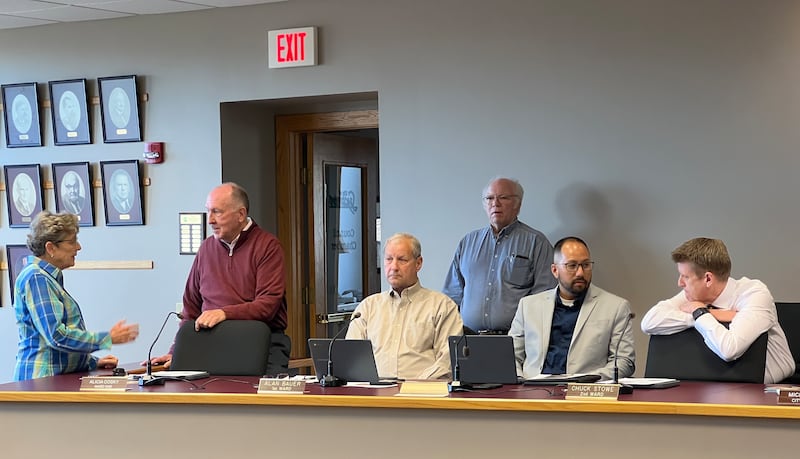SYCAMORE – Figures provided by city officials show the city of Sycamore brings in close to the amount in grocery tax revenue as neighboring DeKalb, which is twice its size.
That was one of the discussion points at this week’s Sycamore City Council meeting, where the majority of members blacked preliminary plans to enact a local 1% grocery tax when the state’s tax expires in January.
If the Sycamore City Council voted to approve what it calls a Municipal Grocery Retailers’ Occupation Tax, a 1% tax would be imposed on most grocery items bought within Sycamore city limits starting in January.
Sycamore City Manager Michael Hall said that because the state has had the grocery tax in place for decades, Sycamore shoppers wouldn’t feel any net impact.
“This has been in place for 45 years,” Hall said. “There won’t be any difference to a family who’s currently paying.”
The tax would be applied to unprepared foods like fresh fruits and vegetables, uncooked meats, dairy products, and packaged food that are sold in Sycamore. It would also be applied to staple groceries such as bread, cereals, rice, pasta and other not ready-to-eat items.
Unflavored, non-carbonated bottled water would also be taxed, according to city documents.
Gov. JB Pritzker eliminated the 1% statewide tax on groceries, which is set to expire Jan. 1, 2026. Although Pritzker cited a desire to ease Illinoisans’ grocery bill burdens, some municipal leaders across the state have bemoaned the impact lost tax revenue will have on local budgets.
Hall said about 3% of the city’s $26.6 million budget is funded through the statewide tax on groceries.
Sycamore received $719,726 from the state for the 1% grocery tax in 2024, down $72 from 2023, according to city provided numbers. That’s near what DeKalb, a city with a population twice the size of Sycamore, has collected in grocery tax also, according to numbers provided by DeKalb city officials.
In 2022, the city of Sycamore received $750,336 in revenue from the state grocery tax that is set to expire. Hall said he’s not sure why the revenue from the tax has gone down since then. Hall also cited figures that showed DeKalb collected $709,611 in grocery taxes in 2022 from the state tax, less than Sycamore. Since then, however, DeKalb has collected more in grocery tax revenue than Sycamore, according to Hall’s numbers.
Third Ward Alderperson Nancy Copple said she thinks more people in Sycamore can afford some groceries compared to their DeKalb counterparts.
“DeKalb, even though they have a lot more people, I see that there’s a lot more, they would – how do I say this without sounding mean? – the demographic will not, they can’t afford some of that stuff,” Copple said. “It’s expensive.”
Fourth Ward Sycamore Alderperson Virginia Sherrod said she agreed that groceries are expensive.
“I’m a professional grocery shopper,” Sherrod said. “I’m telling you, we have limited money. I go where the sales are, even if I have to go to a few extra miles.”
Fourth Ward Alderperson Ben Bumpus was the only person who didn’t back a local grocery tax. He asked Hall if the city had information on the merits of attracting grocery shoppers by not having the 1% grocery tax.
“That’s a hypothetical, there’s no way to gather that information,” Hall said in response. “We don’t stop every shopper to say ‘Why are you shopping here.’”
Bumpus said he worries a tax could have greater impact on lower income families in Sycamore. Hall disagreed, saying he did not buy fresh food as an adult until he started making “more money.”
“I would say those who are more affluent are able to make those healthy choices whereas the less, or poorer, probably do not have those choices,” Hall said. “They’re trying to find fast food that they can get as fast as they can, or the foods that are less expensive. So they’re not able to get those fresh fruits.”
The Sycamore City Council has until Oct. 1 to approve a local grocery tax, documents show. If it does enact the tax, the city won’t be collecting quite as much revenue as it once was. Since a statewide grocery tax was implemented in 1980, Sycamore collected 100% of the revenue generated from local grocery sales, documents show. If Sycamore approves a local tax to begin in 2026, the state will charge a 3% administration fee, meaning the city will receive 97% of tax revenue.
Third Ward Alderperson Marvin Barnes said he was supportive of the grocery tax but said it’s his opinion that state politicians discontinued the tax “for political reasons.”
“The 3%, which they were not charging before, really becomes a new revenue stream for the state,” Barnes said.

:quality(70)/author-service-images-prod-us-east-1.publishing.aws.arc.pub/shawmedia/114d2561-d902-4313-913c-3ed613087b49.png)